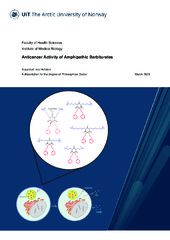| dc.contributor.advisor | Berge, Gerd | |
| dc.contributor.author | von Hofsten, Susannah | |
| dc.date.accessioned | 2023-06-01T08:24:00Z | |
| dc.date.available | 2023-06-01T08:24:00Z | |
| dc.date.issued | 2023-06-20 | |
| dc.description.abstract | Cancer is one of the leading causes of death worldwide. Challenges related to drug resistance, side effects, and poor response rates makes cancer treatment complicated. However, different forms of immunotherapy have been effective for some cancer patients. Oncolytic therapies which can be administered directly intratumorally represent a promising form of immunotherapy. The aim of oncolytic therapies is to kill cancer cells by inducing immunogenic cell death, which can activate a natural anti-tumor immune response.
The current project focused on exploring the potential of amphipathic barbiturates, herein referred to as marine product mimics (MPMs), as novel oncolytic compounds for cancer treatment. The MPMs were developed with inspiration from antimicrobial peptides and the eusynstyelamides, which are a group of natural compounds that have previously been isolated from marine animals.
It was demonstrated that the compound MPM-1 could kill a range of different cell types and induced a necrosis like death in the head and neck squamous cell carcinoma cell line HSC-3. Nine additional MPMs were synthesized and included in further studies. In vitro experimentation indicated that the MPMs have an intracellular target and that they accumulate in lysosomes, which could be part of their mechanism of inducing cell death.
It was demonstrated that the MPMs could cause the release and exposure of damage-associated molecular patterns which are associated with immunogenic cell death, indicating that they could have the potential to be used in oncolytic cancer therapy. An in vivo study was performed where intratumoral injections of MPM-1 were administered to mice bearing B16F1 melanoma tumors. Complete tumor remission was achieved. However, significant protective effects against a rechallenge with the same cancer cells was not observed.
In summary, the MPMs demonstrate potent anticancer activity but whether they have the potential to be used in treatment of human cancer remains to be seen. | en_US |
| dc.description.doctoraltype | ph.d. | en_US |
| dc.description.popularabstract | Cancer is one of the leading causes of death worldwide. The current project focused on exploring the potential of a new type of compounds, called marine product mimics (MPMs), to become new drugs for cancer treatment. The MPMs were designed with inspiration from antimicrobial molecules and natural compounds that have been isolated from marine animals. It was shown that the compound MPM-1 could kill several different types of cancer cells. Nine additional MPMs were made and included in more studies. Results indicated that the MPMs penetrate cancer cells and cause cell death from within. They also caused the cancer cells to release molecules with immune stimulating effects. This suggests that the MPMs can stimulate the immune system to fight cancer. A mouse study was performed where tumors were treated with injections with MPM-1. This caused the tumors to disappear completely. However, whether the MPMs have the potential to be used in treatment of human cancer remains to be seen. | en_US |
| dc.description.sponsorship | UiT - The Arctic University of Norway,
MABIT | en_US |
| dc.identifier.uri | https://hdl.handle.net/10037/29295 | |
| dc.language.iso | eng | en_US |
| dc.publisher | UiT The Arctic University of Norway | en_US |
| dc.publisher | UiT Norges arktiske universitet | en_US |
| dc.relation.haspart | <p>Paper I: von Hofsten, S., Paulsen, M.H., Magnussen, S.N., Ausbacher, D., Kranz, M., Bayer, A., Strøm, M.B. & Berge, G. (2022). The marine natural product mimic MPM-1 is cytolytic and induces DAMP release from human cancer cell lines. <i>Scientific Reports, 12</i>(1), 15586. Also available in Munin at <a href=https://hdl.handle.net/10037/27109>https://hdl.handle.net/10037/27109</a>.
<p>Paper II: von Hofsten, S., Langer, M.K., Korelin, K., Magnussen, S.N., Ausbacher, D., Anderssen, T., … Berge, G. (2023). Amphipathic barbiturates as marine product mimics with cytolytic and immunogenic effects on head and neck squamous cell carcinoma cell lines. <i>Frontiers in Pharmacology, 14</i>, 1141669. Also available in Munin at <a href=https://hdl.handle.net/10037/29294>https://hdl.handle.net/10037/29294</a>.
<p>Paper III: von Hofsten, S., Langer, M.K., Ausbacher, D., Strøm, M.B., Magnussen, S.N. & Berge, G. Intratumoral injection with the marine natural product mimic MPM-1 causes complete remission of B16F1 melanoma. (Manuscript). | en_US |
| dc.rights.accessRights | openAccess | en_US |
| dc.rights.holder | Copyright 2023 The Author(s) | |
| dc.subject.courseID | DOKTOR-003 | |
| dc.subject | VDP::Medical disciplines: 700::Basic medical, dental and veterinary science disciplines: 710::Pharmacology: 728 | en_US |
| dc.subject | VDP::Medisinske Fag: 700::Basale medisinske, odontologiske og veterinærmedisinske fag: 710::Farmakologi: 728 | en_US |
| dc.subject | VDP::Medical disciplines: 700::Basic medical, dental and veterinary science disciplines: 710::Medical molecular biology: 711 | en_US |
| dc.subject | VDP::Medisinske Fag: 700::Basale medisinske, odontologiske og veterinærmedisinske fag: 710::Medisinsk molekylærbiologi: 711 | en_US |
| dc.subject | VDP::Medical disciplines: 700::Basic medical, dental and veterinary science disciplines: 710::Medical immunology: 716 | en_US |
| dc.subject | VDP::Medisinske Fag: 700::Basale medisinske, odontologiske og veterinærmedisinske fag: 710::Medisinsk immunologi: 716 | en_US |
| dc.title | Anticancer activity of amphipathic barbiturates | en_US |
| dc.type | Doctoral thesis | en_US |
| dc.type | Doktorgradsavhandling | en_US |


 English
English norsk
norsk


